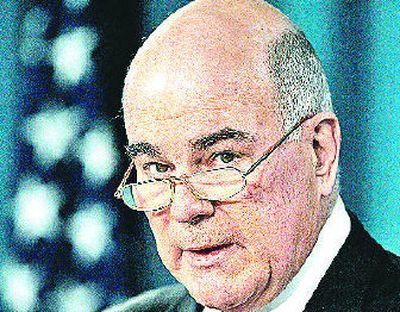Walter Reed fallout spreads

WASHINGTON – Defense Secretary Robert Gates on Friday fired the Army secretary and President Bush vowed to investigate allegations of substandard treatment of wounded soldiers as his administration scrambled to contain fallout from the scandal over squalid housing and bureaucratic delays to outpatient care at Walter Reed Army Medical Center.
The Army also named Maj. Gen. Eric Schoomaker as the new commander for Walter Reed only a day after picking Lt. Gen. Kevin Kiley as the temporary chief. Kiley’s selection had angered soldiers and family groups – and more importantly, Gates – because of their belief that he had been aware of problems at the hospital and done little to address them. Kiley is the Army surgeon general.
Gates made little secret of his dismay when he appeared before reporters Friday to announce the resignation of Army Secretary Francis Harvey. Pentagon officials indicated Harvey had been forced to resign because Gates was angry with how the Army handled allegations of poor care detailed in a series of Washington Post stories. The facility’s commander, Maj. Gen. George Weightman, was dismissed last week and a captain and several lower-level soldiers were reassigned.
“I am disappointed that some in the Army have not adequately appreciated the seriousness of the situation pertaining to outpatient care at Walter Reed,” said Gates. “Some have shown too much defensiveness and have not shown enough focus on digging into and addressing the problems.”
Later, in an interview, an emotional Harvey appeared both apologetic and defensive. “It’s inexcusable to have soldiers in that type of building,” he said, explaining why he resigned.
But he also said the Post stories lacked balance. “Where’s the other side of the story?” he said, his voice rising. “Two articles in your paper have ruined the career of General Weightman, who is a very decent man, and then a captain … and the secretary of the Army. If that satisfies the populace maybe this will stop further dismissals.”
In a sign of the seriousness with which Bush takes the situation, the White House announced that the president would soon name a commission to look into whether there are similar problems at other military and veterans hospitals. Administration officials took the unusual step of releasing early the text of Bush’s regular Saturday radio address, in which the president will vow to ensure that the government meets the physical and mental health needs of soldiers returning from Iraq and Afghanistan.
“Most of the people working at Walter Reed are dedicated professionals,” Bush is to say, according to the text. “Yet some of our troops at Walter Reed have experienced bureaucratic delays and living conditions that are less than they deserve. This is unacceptable to me, it is unacceptable to our country, and it’s not going to continue.”
Taken together, the developments Friday highlighted the anger at the highest levels of the administration over the problems at Walter Reed, as well as the political danger for the White House. Veterans groups remain among the few strong supporters of the war and have been an important part of the president’s political base, yet they – along with military families – have been outraged since the problems at Walter Reed first became public two weeks ago.
Joe Davis, spokesman for the Veterans of Foreign Wars, said the reports had angered members across the country and the group hopes Vice President Dick Cheney will address the issue when he speaks to its legislative conference Monday. “Nobody would believe the military would do this to their wounded,” said Davis. “We want accountability.”
Democrats in Congress have strongly denounced the administration for what they call insufficient attention to the needs of returning soldiers. At least two committees are mobilizing to investigate the Walter Reed situation. Friday, the House Committee on Oversight and Government Reform issued a subpoena to compel Weightman to testify at a congressional hearing Monday.
The committee also released an internal Army memorandum reportedly written last September in which the Walter Reed garrison commander, Col. Peter Garibaldi, warned Weightman that “patient care services are at risk of mission failure” because of staff shortages brought on by privatization of the support work force at the hospital.
Rep. Jim Moran, D-Va., a member of the House Appropriations defense subcommittee and a close ally of leading war critic Rep. John Murtha, D-Pa., said Bush’s proposed new commission was too little too late. “He’s the executive,” said Moran. “This has been six years, and now six years later, after an awful lot of neglect, he’s going to get around to putting a commission together, a study to tell him what to do … I think he’s feeling politically desperate.”
White House officials said politics played no role in their decision to form the new commission, saying Bush was genuinely outraged by the conditions at Walter Reed, which officials indicated he only learned about from the recent news reports. “Once the Walter Reed stories ran, there was a collective feeling in the building, and certainly from the president, that whatever reasons or excuses, it was unacceptable,” said Tony Fratto, deputy White House press secretary.
The new commander for Walter Reed is Maj. Gen. Eric Schoomaker, 58, currently commander of the U.S. Army Medical Research and Material Command at Fort Detrick, Md., home to biological weapon defense research. He is the younger brother of Gen. Peter Schoomaker, the Army chief of staff.